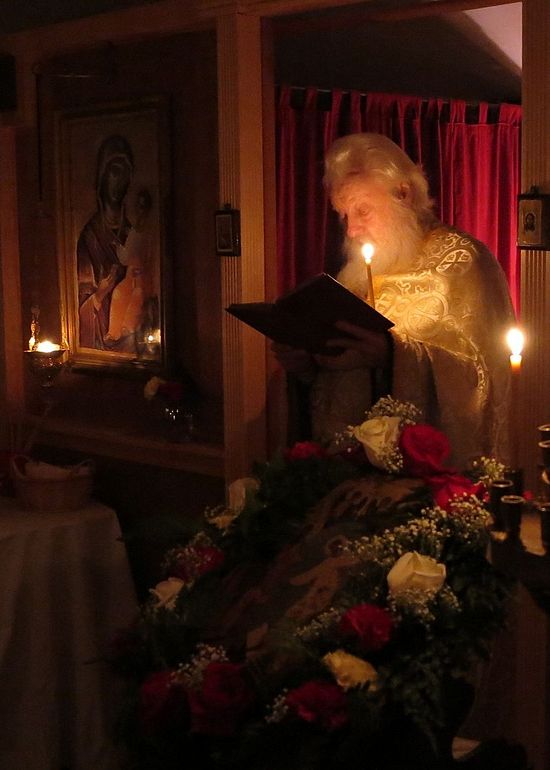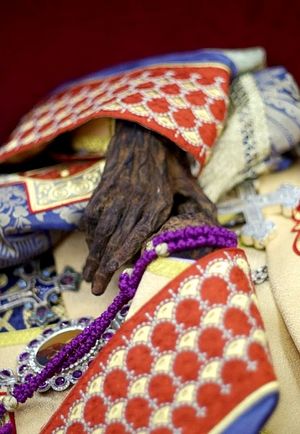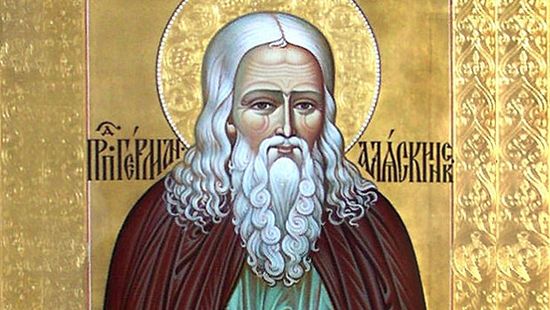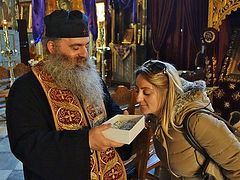 Fr. Alexey Young (now Hieroschemamonk Ambrose) serving Pascha at the skete of the Entrance of the Theotokos in Hayesville, OH (2013). Photo: Ralph Sidway
Fr. Alexey Young (now Hieroschemamonk Ambrose) serving Pascha at the skete of the Entrance of the Theotokos in Hayesville, OH (2013). Photo: Ralph Sidway Several years ago Fr. Alexey Young (now Hieroschemamonk Ambrose) gave a parish retreat entitled “Orthodox Spirituality” which was turned into a six-part VHS series produced by Christian Activist Productions. Fr. Alexey was a spiritual child of Fr. Seraphim Rose, and, as these videos attest, acquired his talent for synthesizing the Patristic Tradition and communicating deep subjects in easy-to-understand language. As the videos are in a format that cannot be posted we will be posting articles, with Fr. Ambrose’s blessing, based on notes on the videos, throughout the Apostles' Fast in honor of the saints who have become masters of spirituality while yet in their earthly lives.
Part 2a
In the spiritual and theological Tradition of the Orthodox Church we can distinguish various degrees of knowledge or ways of knowing. In St. Isaac of Syria we find a schema of three levels of knowledge:
- Bodily: This includes human wisdom and knowledge, and especially the sciences. This carnal knowledge is not wrong or bad.
- Soulish: When we strictly keep the commandments of Christ we begin to acquire knowledge of soul. As we acquire this knowledge we are able to fast, pray, understand Scripture, struggle to acquire virtue, and fight temptations, all of which allows us to acquire yet higher knowledge.
- Spiritual: This is the knowledge that the saints acquire. In a state of holiness they see invisibly, hear inaudibly, and comprehend incomprehensibly the glory of God.
The level of spiritual knowledge is the communion of the saints, in which they come to absolute surety of the Resurrection thanks to this communion with God. The teachings of the Fathers spring from this experience. Thus the Fathers tell us to taste and see for ourselves.
Knowledge of the soul and spirit are closed to those who approach Scripture and the Fathers from the perspective of bodily knowledge. Much of the theology and scholarship that we see is at this level—that is, theology by people who haven’t experienced God.
In Matt. 5:38 we find the Lord’s command to be perfect as the Father in Heaven is perfect, but how is it possible to be perfect? Here “perfect” is synonymous with “holy.” The English word “holy” derives from the Anglo-Saxon term for “whole,” and both words are related in their root to the word “heal,” which tells us something important about holiness. How can we become perfect and whole? The goal of the Christian life is to partake of the Spirit and find union with God’s energies. He who attains this state is a saint and participates in God’s perfection.
In their now famous conversation, St. Seraphim revealed to Motovilov the purpose of the Christian life as the acquisition of the Holy Spirit, with the various ascetical practices aiming towards this end. Motovilov asked how we can know we are communing with God, and St. Seraphim told him to look at him, as he was shining with the light of Christ, making the snow pale almost as if into shadows. Motovilov felt the warmth coming from St. Seraphim almost penetrating his own body, as he was also shining with the same light and able to “see” clearly.
A necessary condition for union with God is active purification—that is, to replace vices with virtues, as otherwise other passions will simply fill the void. Holiness is sharing in the perfection of God. To be ego-centric is to choose death, but to be Theo-centric is to choose life. This mode of being conquers death.
Our spiritual nature has as its lowest component the soul which is the seat of the passions, imagination and emotions, corresponding to bodily knowledge. The higher part is the spirit. At the Fall man’s spiritual nature fractured, and the passions, emotions and imaginations came into existence as means for us to survive outside of Eden, although of course they can also serve to wall ourselves off from God and to forget God.
Most of us, spending our time in the realm of the imagination, emotions, and passions, live in the lowest part of our spiritual nature, which will die with the body. Ego-centrism concentrates all our energy on this lower part—on things such as food and clothing—but the Lord tells us not to worry about these. Especially when we are young we give much attention to the passions dealing with sexual behavior, which are part of bodily knowledge, although they become less important and begin to die out as we get older.
One who is Theo-centric does not encounter the limitations of space, time and corruption, which we see in our Lord Jesus Christ when He walked on water and passed through walls. This mode of being has conquered death. Saints are living proof that Theo-centrism is a reality. At the funeral of St. John Maximovitch one priest said that because he lived in our place and time we have no excuse, and perhaps this is why God revealed him to the Church—so we would know we too can become holy here in America. His incorruption is a sign that something about death is not the same for him. In some small way he didn’t taste of death—that is, his body didn’t return to dust, but is already in the process of conquering death in a foretaste of the Resurrection.
We sometimes have the idea that spirituality is about appeasing God, but it’s emphatically not about this, but rather about spirituality and becoming whole. In the Church we experience some healing, wholeness, and holiness if we just make a little effort. We shouldn’t just expect this life to come to us, and understand that in the Church we’re already in it.
The Fathers says that the Kingdom of God isn’t life after death but rather communion with God that starts in this life. If you don’t find Christ in this world you won’t find Him in the next. And to find Christ in this world you have to understand the beginning—that is, to understand Adam in both his pre- and post-fallen existence.
Part 2b
Imagination (fantasia) resides in the lowest part of our spiritual nature—that is, the soul. Before the Fall imagination was disciplined, but the Fall energized it so that it’s easily dominated by false ideas and images. The saint is he who has overcome these images. In him the imagination and fantasy become dormant.
The Old Testament is full of false images of God being worshiped, perhaps most notably the golden calf at Mt. Sinai, but really, we all do this. We worship money, success, reputation, and so on. But we must take care of the soul before the body because the body will die.
Angels don’t have imagination—only men and demons do. “Idle hands are the devil’s workshop,” as they say, or “an inactive mind is the playground of the devil.” Demons can enact many images to arouse our imagination, and activate images from our memory—images of pornography, for example. The more spiritually ill a man is the more he can be troubled by imagination and images, and so on.
St. Theophan the Recluse teaches that a highly active imagination can bring psychological abnormalities, but the spiritually alert have almost no imagination because they are experiencing the reality of God. Thus the saints appear emotionless in icons. They can look at us directly because they can look at sin without judging.
But what can we do about the imagination? We must carry our crosses without murmuring, and thereby change imagination and its product, emotion, into something highly spiritual: “Through the Cross joy hath come into all the world.” We should start small: pick one cross to bear without murmuring and we will soon feel the difference. From there you can slowly add crosses.
This is the advice of St. John Chrysostom, who told one man to begin simply by not losing his temper with his wife—don’t scold or reprimand, don’t yell or speak sarcastically, and so on. He said not to worry about those he worked with, his kids, and everyone else—but to begin just by focusing on his wife. After a week of success then go ahead and add your children, and if you slip, start over. If necessary, take one child at a time. If we make even a feeble effort then we have the attention of God, the angels, and the saints, and God will send a little extra grace.
Bearing our crosses begins to have an effect on our emotions and imagination. With minimal struggle we begin to cooperate with the energies of God and begin to put things back in their proper place. Our Cross necklace should be a reminder to us that Christ has saved us and that we’ve given ourselves over to Him as slaves—that is, one who has no will of his own, but only obeys.
For instance, we must have obedience to the holy law of fasting. We can’t offer anything to God unless we give up our own will. Fasting can be very difficult or we can ignore it altogether because we are so accustomed to instant gratification, but we must compel our will to take control of just one thing and to begin to subdue the passionate part of our spiritual nature.
Obedience is non-resistance. If someone asks for your coat, give it to him, for example. Christ didn’t tell us to first evaluate the situation—will he spend this money on alcohol? Giving is really for us, not for the panhandler. We need to deprive ourselves of something
We must begin to cultivate the virtue of self-abandonment to God: what is God’s will for me today? Each moment brings an obligation to fulfill a duty—to go to work, do the dishes, mow the lawn, and so on. We are called to focus all our attention on this duty as something given by God for us to grow spiritually. In responsibilities is concealed God’s will for us. God gives us everything that is necessary for salvation.
St. Herman of Alaska was once invited aboard a ship to dine with the captain and some others. He asked them what they regard as most worthy of love, and what they wanted for happiness. He said whether it be riches, fame, glory, a beautiful wife, or command of a fine ship, each wants what he deems worthy of love, with which they all agreed. Continuing, he asked them what could be more worthy of love than Christ? Again they agreed and he asked if they love God, and they said “Of course! How could anyone not love God?” St. Herman bowed his head and said “I, a poor sinner, have tried my whole life long to love God and I can’t say I love Him as I should. To love Him is to think of Him always and always do His will. Do you love Him in this way?” They admitted that they did not, and the saint replied with his now famous line, “From this day forth, from this hour, from this minute let us love God above all.”
Question: Does the Patristic use of “imagination” correspond to the creative arts?
Answer: The Fathers say that all beauty is a reflection of God and can lead us to higher forms of beauty and ultimately to God. Instead of being mere images these things can lead us to reality.
However, much of our art is not beauty. It is ugly and sinful. We must distinguish between what is truly art and what leads to ego-centrism and fulfillment of the passions. For instance, classical music builds good tastes and leads children to higher beauty.
Question: How do you feel about the creative arts for children?
Answer: They should be encouraged within the context of beauty. The Royal Martyrs were extremely pious, and their French tutor was very aware that Nicholas and Alexandra wanted the children’s education to be centered on the Church year. For instance, drama practice didn’t happen in Lent—the children were supposed to focus on the fast and the Church services. Involvement in the arts can be centered on Church life.
Question: It seems easier to unite with Christ as a monastic.
Answer: Monastics are single-minded, but the Fathers also say it’s possible for someone in the world to achieve communion with God, but this requires discipline. Instructing priest-monks about confessing laypeople, St. Basil the Great told them to be gentle, because, he said, the married life is harder.
Question: If we experienced this fracturing at the Fall then what happens in the resurrection to a reunited body, soul, and spirit?
Answer: The reuniting of this fracture must begin in this life because the passions wall us off from God. It must begin here and now because it won’t just magically happen in the next life. St. John of Kronstadt said that if we can manage to live one day keeping all the commandments faultlessly then we will have a taste of Paradise. It is the saints known for such dispassion who usually leave us incorrupt relics.
Question: Can you say more about the holiness of families?
Answer: From Scripture we know that the family is holy as an institution of God. Even if particular members aren’t holy, the family has objective holiness, just as the Church is utterly holy and without blemish despite sinful people.
Everything, including rocks, is in the process of sanctification. We know that all of creation fell and thus all creation awaits redemption, and this includes the possibility of having holy families, businesses, and other institutions.
Question: How can we feed our own souls and the souls of our kids and make them receptive to holiness?
Answer: Take care to surround your children with that which is beautiful. For example, keep an eye on what they watch on TV, take them to museums, and so on. It’s important to start when they’re young. As Dostoyevsky said, beauty will save the world.
Question: Is it possible to be impassioned over good causes?
Answer: Yes, we can have spiritual fervor. The Lord was angry as He drove the money changers out of the Temple, having righteous anger over the honor of His Father’s Temple. He was angry not for Himself but for His Father. We can have righteous anger, or fervor, as long as it’s not on behalf of ourselves personally—against abortion, for example.
We have to be guided by the Church on this, and be very careful because there are false virtues, such as politics. People gave their lives for the civil rights movement. The Church wouldn’t condemn this, but if it also harms others or our own families then it’s at least questionable. We have to take such things on a case-by-case basis. Fr. Seraphim was detached from politics, but he voted. He educated himself enough to make an informed vote. We need a detachment from the spirit of the times, as he had.
Question: If the emotions and imagination are temporary then why did God give them to us?
Answer: They weren’t given to us in their current form, but rather we created them at the Fall. They became separated out from the whole of our spiritual nature which was united to God completely. When we became separated from His grace then imagination and the emotions became empowered and we began to create false idols to worship.
However, with God’s help we can undo the damage caused by the Fall. The Theotokos is the perfect model of this.






